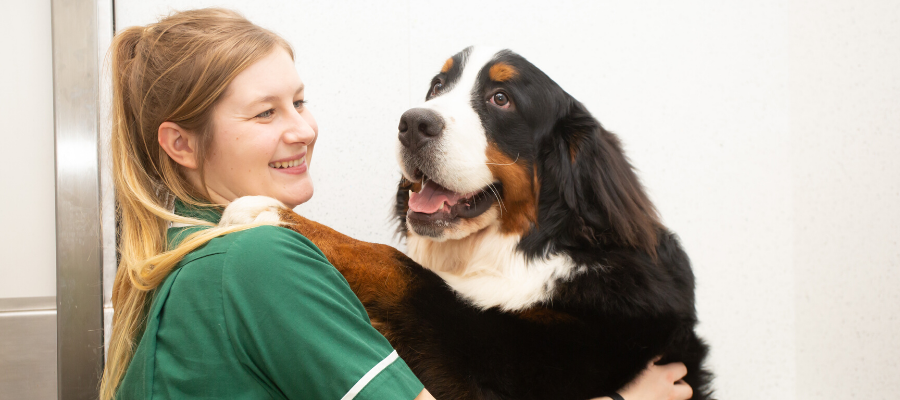
Many of the major infectious diseases affecting dogs can easily and painlessly be controlled by vaccination. A small dose of a harmless form of the disease is used to stimulate the body to build up immunity, and if this infection is encountered in the future, there will be sufficient resistance to overcome it before it can cause harm.
Which diseases do you vaccinate against and how?
The ‘core canine vaccines’ are administered via injection and will immunise your dog against distemper, infectious hepatitis, parvovirus and leptospirosis. We also recommend vaccinating against kennel cough which is a live vaccine squirted up the nose.
What are these diseases?
Distemper (hard pad)
Canine distemper is a highly contagious viral illness with no known cure; thankfully due to vaccinations it is now seen rarely. Symptoms include fever, vomiting, coughing and a hardening of the footpads. Distemper can be fatal, and surviving dogs can be left with permanent twitching or epileptic fits.
Infectious Hepatitis
Canine infectious hepatitis is a viral disease which affects the liver. Very young puppies can die quickly and the disease can spread rapidly amongst a group of dogs. Even with treatment, death is common.
Parvovirus
Parvovirus is a highly contagious and potentially fatal disease in dogs, especially puppies. The virus attacks cells in the intestine leading to haemorrhagic diarrhoea, weakness and dehydration.
Leptospirosis
This is a serious bacterial disease which mainly affects the liver and kidneys, rapidly progressing to cause multiple organ failure and death. It is spread through infected urine, e.g. in contaminated water, causing jaundice, fever, excessive thirst and vomiting. In very rare cases it can be transmitted to humans.
Tracheobronchitis (Kennel Cough)
This respiratory ailment is readily spread between dogs, especially when they are grouped together such as at shows, training classes or boarding kennels. However, as it is an air-borne infection, even dogs that never leave the garden can be affected. The disease affects the delicate lining of the airways leading to a harsh cough, distressing to both patient and owner.
Does my dog need the kennel cough vaccine?
The ‘kennel’ in kennel cough is a misleading name, as it implies that it only needs to be given to pets that spend time in kennels. Unfortunately, this is not the case. Kennel cough spreads most quickly through direct dog to dog contact such as in kennels, at dog shows or on walks in areas heavily populated with dogs. However, just because your dog does not go to these areas does not mean they should not be vaccinated – kennel cough is a highly contagious complex of bacteria and viruses which is spread through infected air particles. There does not need to be dog to dog contact to catch it – it can be spread if an infected dog sneezes, barks or coughs in the environment you walk through.
What precautions should I take with a live vaccine?
It is not recommended to immunise your dog against kennel cough if any member of the household is immunosuppressed. Your vet will advise you as to whether the vaccine is suitable for your dog.
Puppy Vaccinations
Maternal antibodies, passed in the milk from a vaccinated bitch to her puppies, provide vital protection during the vulnerable first few weeks of life. However, when the pups reach 8 – 10 weeks old, this protection begins to wane and therefore it is vital to vaccinate at this point, so that the pup begins to build up its own immunity.
When do I need to vaccinate my puppy?
1st vaccination at 8 weeks
2nd vaccination at 12 weeks
Kennel cough vaccination 1 week after the 2nd vaccination
3rd vaccination at 16 weeks
When can my puppy go for walks?
It is recommended you keep your pup in the house or garden until 2 weeks after the 2nd vaccination. They should be carried and sit on your lap when visiting the surgery and also in public areas so they can get used to different sounds and smells.
Why is the 3rd vaccination needed?
The third vaccine is optional but it is highly recommended. Recent studies have shown that some puppies will not gain sufficient immunity from the primary vaccine course and so a third vaccine at 16 weeks old is needed to provide protection.
When do I need to vaccinate my adult dogs?
Your dog’s first adult vaccination will be a due a year after completing their puppy vaccination course and every year after that. Should you miss the annual vaccination date your dog will need to re-start the vaccination course in order to be fully immunised.
Can my pregnant bitch be vaccinated?
Although breeding bitches need good levels of antibodies to pass on to puppies, it is not advisable to vaccinate a pregnant bitch. Instead, when contemplating breeding, try to ensure that a booster is given shortly before mating.

